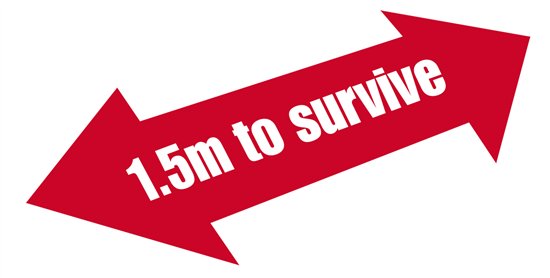BikeNZ has started a 1.5 metre campaign:
 From the BikeNZ material:
From the BikeNZ material:
Would you stand on the spot with your back towards a truck as it drives towards you at 100km/h, knowing it was going to pass within a metre?
Plain lunacy? This is an everyday occurrence for cyclists on our roads.
1.5m to survive is your call to action! (Sign Petition NOW!)
There are nearly 1.5 million of us riding bikes in New Zealand, yet the Ministry of Transport's 10-year Road Safety Strategy discussion document has little to address the safety needs of cyclists. We must act now, (right now...September) if we want cycling conditions on our roads to improve in the next 10 years. This is your moment to speak out!! Submissions close Friday October 2nd, 2009.
Note: CAN is putting together a detailed submission on the Road Safety Strategy - find out more here.

Comments
a different view of 1.5 m
I will not be signing this petition. I think the approach if this campaign is wrong. If it succeeds in getting a road rule change it creates a different set of problems and I think it will increase antagonism between cyclists and other road users. if it doesn't succeed it will probably still have similar effect.
what this law will say, is that a cyclist and another vehicle can never share a lane, regardless of whether it is wide enough to do so. given that it (probably) won't be accompanied by a widening of all roads to accommodate the new restriction, or provide separated cycle paths, it's just going to create a mess, with increased frustration at the delay cyclists cause to other road users .
A campaign that focuses on courtesy or consideration or highlights how vulnerable cyclists are to the mistakes of other road users are much more positive than demanding a piece of road. In New Zealand we have road users that are very possessive about the piece of road they're travelling on and don't show a lot of consideration for cyclists or any other road users. it's those attitudes that I'd like to see changed, but I personally don't think this campaign will help that at all.
a couple of months ago I observed the resentment and deliberate confrontation that a similar law that was just passed in Colorado was causing, and that was claiming 3 feet which is a lot less that 1.5 metre. In general riding in the US these days, and in he past, finds drivers that are pleasantly courteous to cyclists in comparison to in New Zealand. A cynic would say it's fear of liability if they cause injury, but the effect is still positive.
Just to place my views in context I live on a rural state highway, and most of my riding is on rural roads - either riding to work, recreational rides or on cycle touring holidays in other parts of the country. I do ride in the cities when I visit them. Although there is a recreational off-road path near my front gate, I usually choose to ride the state highway as being more useful for getting from A to B
Stephen Wood , based in Central Otago
Having just experienced the
Having just experienced the exceptional courteous behavior of Massachussetts' motorists south east of Boston on tree lined narrow roads, I completely support Stephen's take on this campaign. Courtesy and consideration is what we should be aiming at and of cause off-road routes for those that prefer that.
I once suggested that we should encourage CAN members through e.can and ChainLinks to show really grateful behaviour whenever a motorist did something nice - it was just ignored, so I will now suggest this again, hoping we can take it up. Nothing like positive reinforcement to encourage good behaviour, Adults and children alike.
I have not signed this campaign either and won't.
We don't need new rules, we just need motorists to follow those we already have.
I thought about it but
I thought about it but concluded that signing this
is not in my interests either.
I,and probably a large proportion of the people who don't cycle now are extremely reluctant about entrusting our lives to the whims of drivers of motor-vehicles and will feel no more confident about putting ourselves at their mercy by having our right to do so asserted in yet another authoritarian law.
If we as cycle 'advocates' are working towards making cycling practicable by the general population,-as much as driving motor vehicles is,then we need to focus on lobbying for (the right to use existing) seperate and segregated facilities that can be used by all, including 'vulnerable' user groups - instead of merely working for compromise outcomes like this which serve only the interests of the existing predominantly 'vehicular cycling' culture.
If we don't ask for what we really need, we will never get it.
Alan Preston in Mangawhai, Northland.
http://urbanbicycles.googlepages.com/whyutilitycyclingcan%27thappeninnz